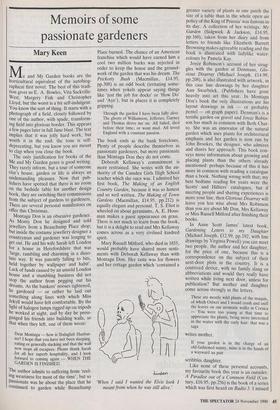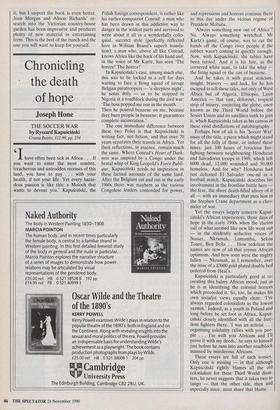Memoirs of some passionate gardeners
Mary Keen
Me and My Garden books are the horticultural equivalent of the autobiog- raphical first novel. The best of this tradi- tion gives us E. A. Bowles, Vita Sackville- West, Margery Fish and Christopher Lloyd, but the worst is a bit self-indulgent. You know the sort of thing. It starts with a photograph of a field, closely followed by one of the author, with spade, transform- ing field into glorious border. This appears a few pages later in full June blast. The text Implies that it was jolly hard work, but worth it in the end: the tone is self- deprecating, but you know you are meant to clap when you close the book.
The only justification for books of the Me and My Garden genre is good writing. They rarely inform, but a tour of someone else's house, garden or life is always an undemanding pleasure. Now that pub- lishers have spotted that there is no room on the bedside table for another design book, they are switching their commissions from the subject of gardens to gardeners. There are several personal manifestoes on offer this Christmas.
Montagu Don is an obsessive gardener. As Monty Don he designed and sold Jewellery from a Beauchamp Place shop; but inside the costume jewellery designer a countryman and gardener was longing to get out. He and his wife Sarah left London for a house in Herefordshire that was large, rambling and charming in a disso- lute way. It was patently falling to bits, held together by wallpaper and habit'. Lack of funds caused by an unsold London house and a stumbling business did not stop the author from pegging out his dreams. As the bankers' nooses tightened, he gardened — or rather he laid out something along lines with which Miss Jekyll would have felt comfortable. By the light of halogen lamps rigged up on tripods he worked at night, and by day he press- ganged his friends into building walls, so that when they left, one of them wrote:
Dear Montagu — how is Stalagluft Hanbur- les? I hope that you have not been sleeping, eating or generally slacking and that the wall now stops all escapees. Please thank Sarah for all her superb hospitality, and I look forward to coming again — WHEN THE GARDEN IS FINISHED.
The author admits to suffering from 'reel- ing weariness for most of the time', but so Passionate was he about the place that he continued to garden while Beauchamp
Place burned. The chance of an American franchise which would have earned him a cool two million bucks was rejected in order to keep the house and the ground- work of the garden that was his dream. The Prickotty Bush (Macmillan, £14.95, pp.308) is an odd book (irritating some- times when yokels appear saying things like 'jest the job for docks' or 'How Do' and `Aye'), but in places it is completely gripping.
Through the garden I have been fully alive. The ghosts of Williamson, Jefferies, Gurney and Thomas drove me on. All failed, died before their time, or went mad. All loved England with a constant passion.
The book ends as the bank forecloses. Plenty of people describe themselves as passionate gardeners, but more passionate than Montagu Don they do not come. Deborah Kellaway's commitment is more restrained. She writes with the au- thority of the Camden Girls High School teacher which she once was. I admired her first book, The Making of an English Country Garden, because it was so honest and so well written. The Making of Town Gardens (Macmillan, £14.95, pp.212) is equally elegant and personal. T. S. Eliot is wheeled on about geraniums, A. E. Hous- man makes a guest appearance on grass. There is not much to learn from the book, but it is a delight to read and Mrs Kellaway comes across as a very civilised kindred spirit.
Mary Russell Mitford, who died in 1855, would probably have shared more senti- ments with Deborah Kellaway than with Montagu Don. Her taste was for flowers and her cottage garden which 'contained a 'When I said I wanted the Elvis look meant from when he was still alive.' greater variety of plants in one patch the size of a table than in the whole open air policy of the King of Prussia' was famous in its day. A collection of her writings, My Garden (Sidgwick & Jackson, £14.95, pp.160), taken from her diary and from letters to friends like Elizabeth Barrett Browning makes agreeable reading and the book is illustrated with ladylike water- colours by Pamela Kay.
Joyce Robinson's account of her strug- gles with the garden at Denmans, Glo- rious Disarray (Michael Joseph, £14.99, pp.208), is also illustrated with artwork, in this case line drawings by her daughter Ann Swarbrick. (Publishers have gone heavily into art this year. In Montagu Don's book the only illustrations are his layout drawings in ink — or probably pentel — on graph paper). Denman's is a terrific garden on gravel and Joyce Robin- son has much in common with Beth Chat- to. She was an innovator of the natural garden which uses plants for architectural emphasis and her garden is now run by John Brookes, the designer, who admires and shares her approach. This book con- veys more information about growing and placing plants than the others already mentioned: perhaps because of this it has more in common with reading a catalogue than a book. Nothing wrong with that; my best bedtime reading for years were the Scotts' and Hilliers' catalogues, but if meeting people and sharing experiences is more your line, then Glorious Disarray will leave you less wise about Mrs Robinson than you are about Mr Don, Mrs Kellaway or Miss Russell Mitford after finishing their books.
In Anne Scott James' latest book, Gardening Letters to my Daughter (Michael Joseph, £12.99, pp.192, with line drawings by Virginia Powell) you can meet two people, the author and her daughter, for the price of one, because this is a correspondence on the subject of their next-door plots in the country. It is a contrived device, with no family slang or abbreviations and would they really have written while living next door, unless for publication? But mother and daughter come across strongly in the letters.
These are mostly wild plants of the maquis, of which Osbert and I would crush and sniff the leaves on our aromatic walks in Corsica — You were too young at that time to appreciate the plants, being more interested in the waiter with the curly hair: that was a saga
writes mother.
If your garden is in the charge of an old-fashioned nanny, mine is in the hands of a wayward au pair
scribbles daughter.
Like none of these personal accounts, my favourite book this year is an outsider. A Paradise out of a Common Field (Cen- tury, £16.95, pp.256) is the book of a series which was first heard on Radio 3. I missed
it, but I suspect the book is even better. Joan Morgan and Alison Richards' re- search into the Victorian country-house garden has been impressive and produces plenty of new material in entertaining form. This is the best of the bunch and the one you will want to keep for yourself.



































































 Previous page
Previous page